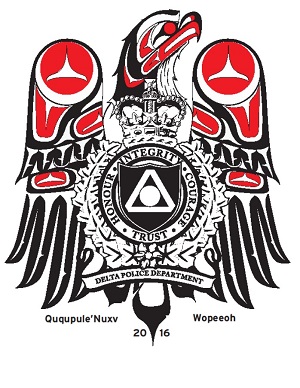By working together in recent years, Mike Grandia, of the Delta Police Department and Tsawwassen First Nation (TFN) leaders and youth have achieved some excellent results such as:
> 25% reduction in calls for police services over the last three years;
> significant increase in TFN members attending drug and alcohol treatment facilities and increase in positive results when returning to the community;
> decrease in violent crime, including domestic violence. And more...
On left is the coat of arms of the Delta Police Department surrounded by TFN artwork, illustrating the link of collaboration in policing that is adapted to, and supportive of, the needs of the TFN community.
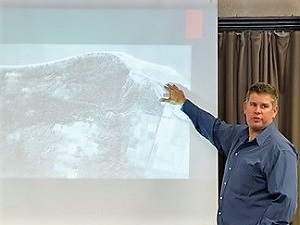 |
Delta Police officer, Mike Grandia, in his normal street dress points out the longhouses and community of TFN long ago -- photo by Mel Baly |
More positive results of the collaborative program of TFN and police have been:
> no TFN youth have been charged with a criminal offence in three years;
> increased and immediate reporting to police and Health and Social Services team of issues when they arise in the community;
> decreased repeat offenses among adults involved in the justice system including chronic offenders;
> positive relationship between the community and policing services;
> increased youth participation in the community;
> increase in willingness for victims to participate in the justice process;
> increase in family and community involvement towards individual and community wellness.
Policing Model: The policing model at TFN is based on a social work model, and seeks long term solutions to community issues, involving education, drug and alcohol related issues, mental health, physical health and culture of the community. The policing model means working closely with Health and Social Services and with Elders, family counsellors, youth workers, language and culture professionals. The Delta Police liaison officer is solely dedicated to TFN, wears plain clothes and drives an unmarked police, maintains relationships on TFN Lands and with outside stakeholders, attends all critical incidents and most community functions and youth events, maintains daily dialogue with TFN staff, government and community members about current issues, trends and positive events in the community.
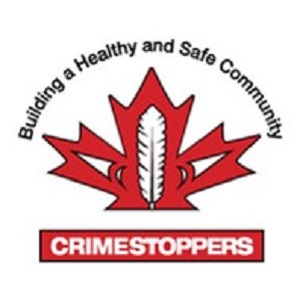 | |
| Crime Stoppers logo customized by TFN for their use in the community | |
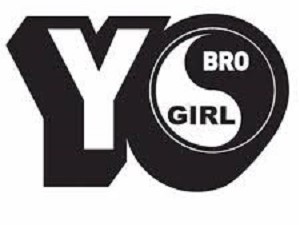 | |
| After school program, Yo Bro/Yo Girl Youth Initiative started in March 2017 | |
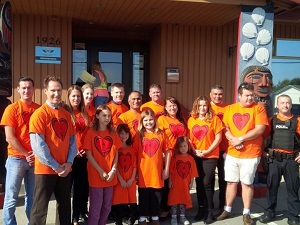 | |
| Delta Police Chief Neil Dubord and TFN Chief Bryce Williams with Mike Grandia and some TFN members of various ages on Orange Shirt Day |
 |
| Annual Canoe Journey takes police with TFN members to various First Nations in BC |
 |
| Education by various outside agencies for youth and parents on a wide range of health and safety topics |
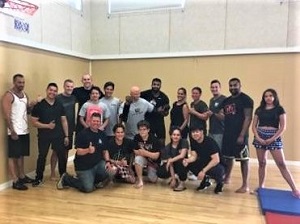 |
| After school sports and recreation program |
Youth Initiative: The Yo Bro/Yo Girl Youth Initiative started in March 2017 at TFN as an after school program of physical fitness training, personal safety training, leadership opportunities and team building activities. Its programming addresses violence prevention and intervention, drug prevention, and youth mentorship development through collaboration among schools, law enforcement agencies, and the criminal justice system.
Education: Outside community organizations, including Delta police, provide TFN youth and parents with education around drug/alcohol use, bike safety, internet safety.
Orange Shirt Day: Every September 30th Orange Shirt Day recognizes the harm of residential schools to children's sense of self-esteem and well being, and confirms the commitment to "everyone around us matters". #EveryChildMatters
Youth: For nine reporting jurisdictions in 2013/2014, as in previous years, Aboriginal youth represented 7% of youth, but accounted for 41% of all admissions to youth correctional services. Aboriginal girls accounted for 53% of female youth admitted to the corrections system; 38% of males were Aboriginal.
Youth Diversion: The structured, impersonal criminal justice system does not provide a supportive environment for youth learning and growth. Youth often struggle to create a new identity such as “drug user”, “drug dealer” or “gang member”, but a caring community can ensure youth identity as family member, community member, cultural or spiritual person, leader. Restorative justice leads to higher rates of compliance with agreements, greater fairness and satisfaction perceived by victims and offenders, increased closure and wellbeing for crime victims, reduced costs and greater efficiencies in responding to crime.
Team/Community Approach: TFN social workers, counsellors and youth workers and police collaborate and with courts, probation, treatment facilities and other community agencies.
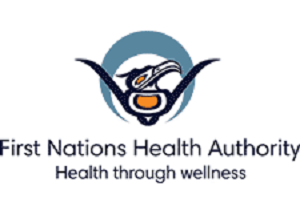 |  |
 | |
| First Nations Health Authority and Little House Society are some of the agencies supporting the TFN community policing system. Thanking Mike Grandia are Club President Ulf Ottho and Ladner Rotarian Chris Offer, formerly a member of the RCMP and then Vancouver Police Department -- photo by Mel Baly | |
